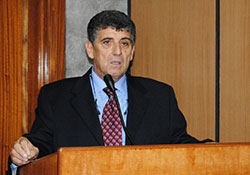From the migration front line: interview with Lampedusa doctor

Dr Bartolo is head of health services on Lampedusa, a small island with less than 6000 inhabitants that has become known worldwide as a southern door to Europe for migrants coming mainly from Middle Eastern and sub-Saharan countries. Dr Bartolo has coordinated the island's health services since 1990, and is one of the two doctors that assist people upon their arrival at the dock: "Working with migrants is not in my job description. I have never received a cent for doing this. I have never asked for it and I would never take it. But I am the doctor responsible for the health of this island."
When first interviewed by WHO/Europe in December 2013, Dr Bartolo claimed his dream for the future was "no more deaths in the Mediterranean". Unfortunately, this is far from coming true; recent estimates indicate that many hundreds of people have drowned while attempting to cross the Mediterranean sea to Europe.
Continuous, large migrant influxes overwhelm health-system capacity
The frequency and size of migration flows crossing the Mediterranean sea have increased substantially in recent years, as people flee war, poverty and repression, seeking a better, more prosperous and secure future.
"One night, ten days ago, we received 1200 migrants," says Dr Bartolo. With his colleague, he undertook initial triage at the dock. "Most of them spend hours in the coast guard boats after being rescued, and therefore arrive soaked to the skin and suffering from hypothermia. From both the human and health perspectives, I prefer to do a first quick triage that allows me to know who is seriously sick and who isn't."
While migrants in relatively good health are taken to the reception centre, those who need urgent medical care are usually transferred to the hospital facilities on the island. Dr Bartolo says, "This week we had a very complicated disembarkation, with over 20 people who suffered major burns. Our facilities were overwhelmed, so we asked for help from the Ministry of Health and the health authorities in Sicily, who took people by helicopter to the hospital in Catania [Sicily]."
A preventable public health challenge
According to Dr Bartolo, the most common health problems he encounters in new arrivals are hypothermia and burns due mainly to contact with petrol: "Later on, once they have settled in the reception centre, I conduct a more detailed triage, with the doctor at the centre, in which we pay attention to other health problems, such as chronic diseases."
Mental health problems are also common, particularly among young migrants who have been victims of torture and violence. Dr Bartolo adds, "The young ones are able to cope with everything, as soon as they have been able to make it to 'the land of freedom'. But later on, once they realize that this is not the end of the journey, the psychological problems arise."
WHO assists countries' responses to large influxes of migrants
WHO/Europe works with European countries to strengthen their health systems' capacity to adequately manage the public health implications of large migration inflows. It created the Public Health Aspects of Migration in Europe (PHAME) project in 2012, with the support of the Ministry of Health of Italy, as a response to countries' increasing need to address the issue. WHO and the health ministries concerned have conducted joint assessment missions in Bulgaria, Cyprus, Greece, Italy, Malta, Portugal and Spain, examining migrants' health needs and countries' preparedness to meet them.
"Malta is one of the countries affected by the issue of migration. This week, the world rose to the tragedy that happened in the Mediterranean and called for action from all sectors. Malta welcomed the assessment done by the WHO team on our national preparedness for the massive influx of migrants, which highlighted the need for support. I thank WHO for its support and thank all the workers from various entities who work hard to support migrants coming to Malta in all their needs," said Mr Chris Fearne, Parliamentary Secretary for Health, Ministry for Energy and Health, Malta.
In Italy, the joint assessment led to the establishment of a group that worked out the first public health contingency plan for migration for the region of Sicily. The Regional Parliament of Sicily adopted the plan on 23 September 2014. Besides this first step, WHO/Europe continues to provide technical assistance to Italy and other countries that are on the migration front line, to address the preventable public health challenges involved.
Anonymous heroes
"You have to believe me, we are making miracles here." When asked about the conditions of health care workers in Lampedusa, Dr Bartolo describes his doctor colleague and the coast guard personnel as his best support: "I am lucky to collaborate with these people who I know will never step back. Sometimes I don't have time to go back home for a whole week, but my colleagues and their permanent availability and professionalism give me the necessary strength."



